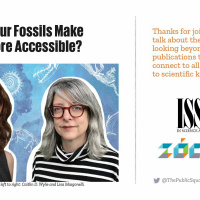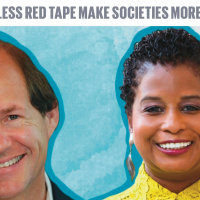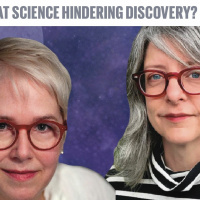Sinopsis
An innovative blend of ideas journalism and live events.
Episodios
-
How Do Homelands Cross Borders?
21/03/2022 Duración: 59minTo leave your birthplace behind and make a home elsewhere is to cross any number of boundaries—national and linguistic, religious and spiritual. While loss is an inevitable part of this journey, it’s not just about displacement; it is also a story of cultural change and celebration. Migrants and immigrants find new ways to balance assimilation and tradition—and to create entirely new identities. This reinvention happens at home and out in the world, and cuts across religion, food, and art. Its impact is as personal as it is global. How do people who are separated from their homelands reinvent cultural practices in their new communities? How does cultural identity change across generations and over time? Ragamala Dance artistic directors, choreographers, and principal dancers Ranee Ramaswamy and Aparna Ramaswamy, writer and Science Fiction Poetry Association president Bryan Thao Worra, and USC Institute of Armenian Studies director Shushan Karapetian visited Zócalo to discuss how they are reimagining what hom
-
Does The First Amendment Still Protect Free Speech? at Zócalo Public Square
26/02/2022 Duración: 01h07minLive from the ASU California Center: Legal scholars Jody David Armour of USC and Eugene Volokh of UCLA, attorney Jean-Paul Jassy, and Battinto L. Batts Jr., dean of the ASU Cronkite School, visit Zócalo to discuss how we might protect free expression while also protecting our society from the misuse of that freedom. Tonight’s event is moderated by Los Angeles Times editorial writer Carla Hall. Visit https://www.zocalopublicsquare.org/ to read our articles and learn about upcoming events. Follow along on Twitter: https://twitter.com/thepublicsquare Instagram: https://www.instagram.com/thepublicsquare/ Facebook: https://www.facebook.com/zocalopublicsquare LinkedIn: https://www.linkedin.com/company/z-calo-public-square
-
Can Bureaucracy Start a Climate Revolution?
18/02/2022 Duración: 49minThe struggle to limit carbon emissions often pits sustainable energy against fossil fuels. But does it have to be this way? As Kartikeya Singh writes in a new essay for Issues in Science and Technology, India’s carbon-heavy government ministries have shown a surprising ability to engineer deep change: the nation brought electricity to over half a billion citizens between 2009 and 2019, then presided over a grid where wind and solar became cheaper than power from coal. Could these ministries—which employ 20 million people—transform the country’s energy sector to be ecologically and economically sustainable? Instead of pinning all our hopes on technology, entrepreneurs, and politicians, what can the world accomplish by harnessing fossil fuel bureaucracies for the future? Center for Strategic and International Studies senior associate Kartikeya Singh visits Zócalo to ask how bureaucracies might embrace obsolescence and reinvent themselves to address today’s most urgent problems. This Zócalo/Issues in Science and
-
Can California Solve Its Air Quality Inequality?
28/01/2022 Duración: 58minWhile smog in Los Angeles and wildfire smoke in San Francisco dominate headlines, California’s rural communities are also besieged by a constellation of forces that foul their air. In the San Joaquin Valley, one of the most polluted parts of the state, one in six children have asthma, and the impacts of air pollution cost the region $3 billion annually. Air quality is a statewide issue—more than half of California’s counties fail to meet federal pollution standards. But the burden isn’t evenly distributed: Black and Latino people are exposed to about 40 percent more fine particulate matter from cars, trucks, and buses than white Californians, and low-income communities about 20 percent more than their higher-income counterparts. What would it take for the more privileged parts of California to reduce air pollution that disproportionately affects low-income and rural communities around the state? What political and economic strategies have succeeded in improving air quality locally and statewide? And can peopl
-
How Do We Begin Again? at Zócalo Public Square
08/12/2021 Duración: 01h55sIt feels like it’s time for something new. Facebook and Kanye just changed their names. More than half of Americans want to change jobs, and one-third want to switch careers. Businesses are reinventing the way they operate. And social movements are trying to create new systems that are anti-racist and sustainable. Isn’t all this easier said than done? Even after confronting the challenges of the past year and a half, we are finding that our old ways are more deeply entrenched than we expected. What do we need—individually and collectively—to start new chapters and rebuild? Which rituals and practices have societies around the world used to successfully start over? And what sort of new beginning does this current moment require of all of us? Artist and co-founder executive director of Homeboy Art Academy Fabian Debora, TransLatin@ Coalition president and CEO Bamby Salcedo, and UCLA distinguished professor and psychology department chair Annette L. Stanton visited Zócalo to explore the best ways to make a fre
-
Can Dinosaur Fossils Make Science More Accessible At Zócalo Public Square
03/12/2021 Duración: 01h02minUniversity of Virginia social scientist Caitlin Donahue Wylie, author of “Preparing Dinosaurs: The Work Behind the Scenes” and a new essay in “Issues in Science and Technology” on the topic, visits Zócalo to talk about the power of looking beyond Ph.D.s and publications to recognize and connect to all who contribute to scientific knowledge. Today’s Zócalo/Issues in Science and Technology event is moderated by Issues editor-in-chief Lisa Margonelli. Read more about our panelists here: https://zps.la/3cjL6OA For live captioning, please turn on the video’s caption feature. Visit https://www.zocalopublicsquare.org/ to read our articles and learn about upcoming events. Follow along on Twitter: https://twitter.com/thepublicsquare Instagram: https://www.instagram.com/thepublicsquare/ Facebook: https://www.facebook.com/zocalopublicsquare LinkedIn: https://www.linkedin.com/company/z-calo-public-square
-
Is There Still Merit in a Merit-Based System? at Zócalo Public Square
17/11/2021 Duración: 01h16sCalls are growing for the dismantling of the meritocracy—educational systems and economic structures that claim to elevate individuals based on merit, but instead favor those with wealth or racial privilege. As elites turn against the very merit-based systems that elevated them, governments, corporations, schools, and other entities are extending old policies—like affirmative action—and embracing new initiatives for equity and inclusion. But as we rid our society of standardized tests, “gifted” schools and programs, and traditional corporate hierarchies, finding new methods of evaluation and promotion is proving difficult. What value, if any, do the ideas of merit and merit-based decision-making retain in this moment of reassessment? What were the origins and intentions of those who created merit-based systems for scholarships and federal employment, and how have those systems fallen short? Do today’s profound social inequalities reflect a fundamental failure of the idea of meritocracy, or a corruption of an
-
Is it Time to Throw Away Our Resumes? at Zócalo Public Square
22/10/2021 Duración: 59minWe are failing Americans without college degrees. Research shows that up to 30 million workers without four-year degrees are drastically underpaid, and have the skills to earn 70 percent more than what they’re currently making. What accounts for this failure of the labor market? One problem is that traditional resumes don’t show or verify the full range of a worker’s skills—including those gained in the military and volunteer work, not to mention family businesses and caretaking. But there’s a promising digital fix that could help: learning and employment records. LERs are digital profiles that allow individuals to document their knowledge and skills, no matter how they were acquired—and have the potential to transform hiring while fueling innovation. What is an LER, and how can it be used to record everything you’ve ever learned? How can this technology be designed and implemented to create more jobs with good wages? And what will it take to design and implement LERs that make the labor market fairer to all
-
Will a New Generation of Leaders Shake Up L.A.’s Culture?
01/10/2021 Duración: 01h09minOver the past year, directors of cultural institutions across Los Angeles have announced their retirements, which means a new generation of cultural leadership is upon us. But despite a desire for change that seems nearly universal, new directors must still answer to many of the same funders and face the same pressures as their predecessors—to raise money or sell tickets, to scale up, to stay relevant—all while navigating post-pandemic reopenings and reckonings around race and inclusion. What does Los Angeles need from its new guard of cultural leaders? What obstacles do their institutions face, and how can these new faces surmount them? Will all of the city’s culture centers even survive? California African American Museum executive director Cameron Shaw, Inner-City Arts president and CEO Shelby Williams-González, and MAK Center for Art and Architecture director Jia Yi Gu visited Zócalo to discuss the change they plan to be and want to see in one of the world’s most vibrant cultural capitals. This Zócalo/H
-
How Could Less Red Tape Make Societies More Equal? at Zócalo Public Square
09/09/2021 Duración: 57minTo merely open a bank account or secure a driver’s license, people around the world face one common barrier: paperwork. Americans, in fact, spend 11.4 billion hours a year on federal paperwork alone. Harvard legal scholar Cass R. Sunstein, former administrator of the White House Office of Information and Regulatory Affairs, has a name for this kind of drudgery: sludge. Sludge, he argues, doesn’t just cost time, money, and dignity—it does an immense amount of damage to society’s most vulnerable people. Bureaucratic red tape—“volokita” as it’s known in Russian—hinders everything from gaining access to food to securing healthcare. How could less paperwork help the least wealthy, least healthy, and least educated improve their station in life? Have any countries or institutions figured out what it would take to make this happen? Sunstein, author most recently of “Sludge: What Stops Us from Getting Things Done and What to Do about It,” visited Zócalo to talk about eliminating the piles of paperwork obscuring our
-
Can California Help America Reduce Gun Violence?
20/08/2021 Duración: 01h05minThe United States has more firearms (390 million) than people (325 million), routinely experiences mass shootings, and suffers rates of gun violence far higher than other wealthy countries. California has touted itself as a safer model, with the most gun regulations in the country, the 44th lowest rate of gun violence among the 50 states, and a 9 percent decrease in gun deaths over the last decade, compared to an 18 percent increase nationwide. Has California—with its diverse mix of dense urban centers and rural communities—found strategies that could reduce gun violence around the country? How vulnerable are California’s laws and strategies to federal judges bent on rolling back gun controls, including the state’s longstanding ban on assault weapons? And what can California—which has seen gun ownership and deaths rise amidst the COVID-19 pandemic—do now and in the future to reduce gun injuries and deaths even further? California Assemblymember Phil Ting, UC Davis Medical Center emergency medicine physician
-
Is Cutthroat Science Hindering Discovery?
11/08/2021 Duración: 58minLaboratories around the world are under fire for their lack of diversity, a culture of harassment and bullying, rigid hierarchies, and research that cannot be reproduced. Is the entire research system to blame? Our model of funding individual scientists encourages cutthroat competition rather than a cooperative infrastructure better tailored to solving our biggest problems. In a recent article for Issues in Science and Technology, NASA mission lead and ASU professor Lindy Elkins-Tanton argues for a radical restructuring of the way we do research—divesting from big names and instead deploying teams to focus on big questions and ambitious goals. Can egalitarian, interdisciplinary groups of experts reshape research for the better? How will breaking away from the current model open the floodgates for more invention and discovery? NASA’s Psyche mission principal investigator and ASU Interplanetary Initiative vice president Lindy Elkins-Tanton and Issues in Science and Technology editor in chief Lisa Margonelli v
-
Is South L.A. Forging a New American Identity? at Zócalo Public Square
29/07/2021 Duración: 49minSouth Los Angeles, one of the West Coast’s last great working-class places, has been a destination point for two great migrations: African Americans arriving from the South and East, and, more recently, Latin Americans immigrating to Southern California. While media have long dwelled on examples of interracial and interethnic conflict there, the everyday reality of South L.A.’s ever-changing neighborhoods has revolved around Black-Brown co-existence, cooperation, and innovative multiracial organizing. How have South Central’s diverse residents managed to find solidarity in unsettling and polarizing times? What new and shared place-based identities have emerged from the area’s mix of histories and cultures? And what can the rest of L.A., and the U.S., learn from South L.A.? USC sociologists Pierrette Hondagneu-Sotelo and Manuel Pastor, co-authors of South Central Dreams: Finding Home and Building Community in South L.A., and Corey Matthews, chief operating officer of Community Coalition, visit Zócalo to expl
-
How Have Women’s Sports Changed Since Title IX?
25/06/2021 Duración: 01h07minWhen Gertrude Ederle became the first woman to swim the English Channel in 1926, she beat the record of every man who’d attempted it before her—by two hours. And she did it in a two-piece bathing suit that she’d fashioned herself, eschewing the bulky wool dress, stockings, and shoes expected to be worn by women swimmers for modesty’s sake. Before Title IX’s 1972 passage, Ederle, and pioneering sportswomen from Mildred Ella “Babe” Didrikson Zaharias to Wilma Rudolph to Billie Jean King, began the work of breaking down cultural norms around sex and sport, as well as race and class—while making history in the process. In what ways has the world changed since women were denied the opportunity to compete because of their biology? What forgotten feats by trailblazers, on and off the turf, have been relegated to the footnotes of history? And how have earlier fights for gender equality laid the groundwork for today’s debates over equal pay, anti-trans legislation, and other issues? LPGA and World Golf Halls of Fame
-
What Makes A Good Small Town?
18/06/2021 Duración: 01h10minCalifornia’s smaller cities are pitied, when they’re thought about at all. Media coverage of towns, especially in rural areas, emphasize their poverty, their lack of amenities and people, or their supposedly clannish cultures or peripheral politics. But the reality is that small towns stand at the center of California’s biggest challenges—climate, energy, inequality, public health, education, water, broadband access, and homelessness. And some smaller and more remote places have found clever solutions to problems that bedevil big cities. What is it like to govern a small California town in the third decade of the 21st century? And what lessons can the rest of California learn from the struggles and successes of its smaller settlements? Gonzales city manager Rene Mendez, Coachella councilmember and civil rights attorney Megan Beaman Jacinto, and former West Sacramento mayor Christopher Cabaldon visited Zócalo to discuss what makes a good small town. This Zócalo/Cal Wellness online event was moderated by Los A
-
What Will It Take to End Homelessness In L.A.? at Zócalo Public Square
16/06/2021 Duración: 01h07minToday, more than one-quarter of all unsheltered people in the United States live in L.A. County. And of all Angelenos experiencing homelessness, more than 70 percent are sleeping in the streets, or in makeshift structures, tents, or vehicles. Homelessness has always been a public health and humanitarian crisis, but the crisis has been exacerbated by the continued lack of affordable housing and the global pandemic. Policy changes and unprecedented housing investments, including Projects Roomkey and Homekey—converting hotels into housing—and the federal American Rescue Plan, haven’t been able to keep up with rising evictions and housing costs. Meanwhile, the issue is bitterly dividing neighbors and becoming a source of intense conflict in local politics. And elected officials, organizations dedicated to helping unsheltered people, and other stakeholders cannot agree on whether to put their resources toward local, interim housing or creating more permanent housing solutions. What should the city do to ease the c
-
Can We Still Find the Good in the World?
11/06/2021 Duración: 01h01minZócalo and the University of Toronto present The World We Want, an event series exploring our current societal, political, and economic challenges and how we might emerge from the current moment. The series ends with “Can We Still Find the Good in the World?” It feels like such a dark time. The planet is burning with hatred, disease, and environmental degradation. And, between the confusing nature of our societies and our own biases, traumas, and privileges, it’s become increasingly difficult to be sure we will know the good when we see it. What does it mean, when the bad urgently demands our attention and action, to spend precious time looking for the good, in the world and in ourselves? What are the roots of the human attraction to goodness, and what roles does our pursuit of goodness fill in our lives and communities? Central European University president Michael Ignatieff, author of “The Ordinary Virtues,” visited Zócalo to examine whether the human search for the good is itself still good. This online d
-
How Do Artists See the Next L.A.? at Zócalo Public Square
04/06/2021 Duración: 01h01minAs Los Angeles emerges from pandemic and tumult, Angelenos are looking for new and bigger visions of the city’s future. But where will we find ideas and practical methods for transforming institutions, reimagining public policy, or reinvesting in communities? Business leaders are consumed with recovery. Elected officials aren’t trusted, because they have long failed to deliver on their biggest plans and promises. So why not turn to L.A.’s most creative visionaries, and tap our abundance of artists? The pandemic and racial reckoning of the past year have changed how artists work, and how they see L.A. What aspirations and dreams do artists—professional and youth, visual and performing—have for a more resilient and inclusive Los Angeles? How are they putting those dreams down on canvas, on walls and sidewalks, and on our screens? LA Commons CEO Karen Mack, artist and designer Rosten Woo, and John Malpede, artist and founding director of Los Angeles Poverty Department, visited Zócalo to discuss the change they
-
Can Boyle Heights Save America? at Zócalo Public Square
28/05/2021 Duración: 01h09minBoyle Heights may be divided up by L.A. freeways and thoroughfares, but its people have a remarkable record of maintaining solidarity across racial and ethnic lines. What explains the ability of Boyle Heights residents to stick together while constantly integrating immigrants and incorporating newcomers? How has Boyle Heights kept its distinctive identity in the face of social upheaval, political transformation, and waves of gentrification? And what can a more diverse America, and a more globalized world, learn from the history of this magical and multiracial neighborhood in the center of Los Angeles? Josefina Lopez, author of “Real Women Have Curves” and Founding Artistic Director of CASA 0101 Theater in Boyle Heights, joined USC professor of American Studies, ethnicity, and history George J. Sanchez, author of “Boyle Heights: How a Los Angeles Neighborhood Became the Future of American Democracy,” at Zócalo to examine whether the neighborhood that birthed him might point the way to a better future for the
-
Does America Really Want to Be a Nation of Immigrants? with Jia Lynn Yang
21/05/2021 Duración: 01h08minThe year 1924 was a watershed in American immigration. A victory for the eugenics movement, the Johnson-Reed Act established race-based quotas that succeeded in limiting the entry of Jews and Catholics from Southern and Eastern Europe, as well as strengthening restrictions already in place barring the entry of Asians and Africans. It would take an extraordinary political window following the assassination of President John F. Kennedy to overhaul the quota system through the Immigration and Naturalization Act of 1965. By giving preference to family reunification and skilled workers, the legislation changed the demographics of the country, making it less European and less white. At the same time, it imposed the first numerical cap on Western Hemisphere immigration, making the U.S. less accessible for people coming from Mexico and other Latin American countries. What lessons can we draw from these two historic shifts in American immigration? Has the United States ever been the nation of immigrants that it purpo






















